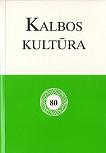„Anykščių šilelio“ politekstas: autoriteto suspendavimas ar įtvirtinimas?
The polytext of Anykščių Šilelis (The Forest of Anykščiai): suspending or consolidating the authority?
Author(s): Paulius V. SubačiusSubject(s): Language and Literature Studies
Published by: Lietuvių Kalbos Institutas
Keywords: Polytext; iterability; autograph; versions of text
Summary/Abstract: Contemporary discussions of ‘whatness’ of the text refer to the problems related to the system of notation, qua a set of instructions for iterability of the text. Those theorists who question Nelson Goodman’s distinction between authographic and allographic arts and his understanding of the role played by notation, have referred to examples from the sphere of music, when the author records the same work through differently notated versions. In order to study textual ambiguities and the complications involved in different notations, one may find helpful the analysis of various versions of the poem The Forest of Anykščiai by a 19th century Lithuanian poet Antanas Baranauskas. The author has published the poem himself in Weimar in 1882, as part of the brochure Ostlitauische Texte, arranging its text into two different versions, each corresponding to a different system of notation, printed on the facing pages of the book. One of the versions represents the text of the poem in the author’s own dialect. The system of notation of the other version is a complex one: it was created by Baranauskas himself as an instruction that enables one to read the poem in every one of the eleven dialects of the Lithuanian language. The paper discusses the way in which this particular case of unique notation of a poetic text supports the concept of textual instability. In the analysed example, the fluctuation between different readings and the document itself is presupposed by the document not in an accidental, but in a fundamental way. Does the paradoxical suspension of authority in phonetics, one of the areas, testifies to the erosion of authority as a whole? Perhaps, on the contrary, it is an attempt to control at least 11 types of reading at once? It is beyond doubt, however, that Baranauskas relinquished that cultural principle according to which one dialect or the standard version predominates. Even if we parenthesise the standpoint of the author himself, we cannot but view the right-hand pages of the Ostlitauische Texte, and especially the totality of the multiple edition, as a pre-programmed polytext.
Journal: Bendrinė kalba (iki 2014 metų – Kalbos kultūra)
- Issue Year: 2007
- Issue No: 80
- Page Range: 135-142
- Page Count: 8
- Language: Lithuanian

